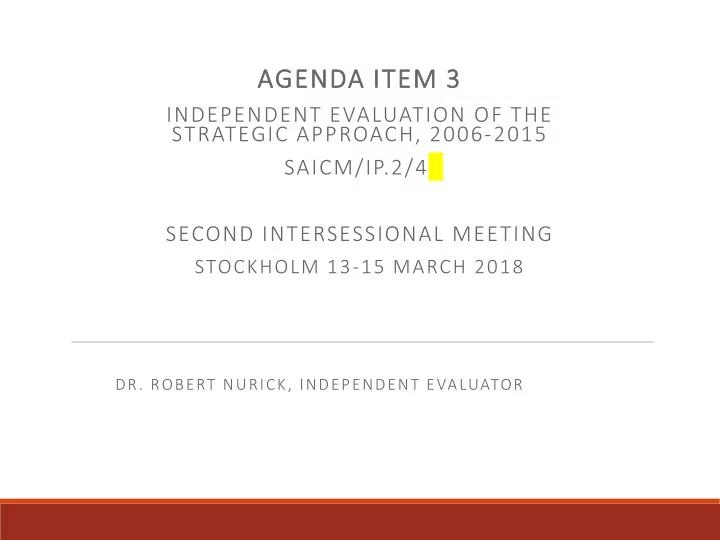

AGENDA I ITEM 3 M 3 INDEPENDENT EVALUATION OF THE STRATEGIC APPROACH, 2006-2015 SAICM/IP.2/4 SECOND INTERSESSIONAL MEETING STOCKHOLM 13-15 MARCH 2018 DR. ROBERT NURICK, INDEPENDENT EVALUATOR
Objectiv ive of of Evalu luatio ion To provide information to enable the intersessional process to develop recommendations and to enable ICCM5 to take an informed decision on future arrangements for the Strategic Approach and the sound management of chemicals and waste beyond 2020
Approa oach f for Eval aluation on • Framed within a Theory of Change approach • Review of documents • On-line survey • Focus group discussions • Further round of engagement with stakeholders • Finalized for OEWG3
Insti titu tuti tional S Str tructu ture of t the Strategic A c Approach ch International Conference on Chemicals Management- ICCM
Gover ernan ance o of the e Strategi gic A Approach
Theor eory o y of Change
Stra rategic Approa oach - Stren engths Awareness of integrated nature of chemicals management Voluntary approach has allowed voices of non-governmental stakeholders to be heard Successes achieved in knowledge sharing and information; risk reduction; governance; capacity-building OPS objectives Lead in paint Emerging Policy Issue Indicators of progress
Str trategic c Ap Approach - weaknesses es & g gaps Capacity issues of SAICM Secretariat National focal point model Funding constraints for SAICM implementation Illegal international traffic OPS objective Progress on EPIs Role of UN agencies (IOMC) in support of SAICM implementation Monitoring effectiveness of SAICM implementation
Lesso essons L s Learnt Legisation and implementation for sound management of chemicals Common standards and SDGs Adaptive management regimes: technical capacity and monitoring impact Integration across sectors and stakeholders Transfer of technologies and role of stakeholders Transparent sharing of information and collaborative relationships Financing of SAICM
SAICM/IP.2/4 Welcome and encourage input from all SAICM stakeholders by 16 April 2018. saicmevaluation@gmail.com Thank you.
Recommend
More recommend